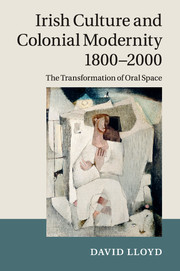Chapter 2 - Closing the mouth
disciplining oral space
Published online by Cambridge University Press: 07 October 2011
Summary
I
Sinéad O’Connor’s still haunting track, ‘Famine’, opened with the uncanny sound of a dog howling. The sound remains uncanny for several reasons. It is impossible to tell if the howl is of hunger, grief or some condensation of the two; it is difficult to determine whether the sound we hear is actually a dog’s howl or a human imitation of the sound, a difficulty which in itself opens the uncanny domain where the human and the natural converge and mimic one another; this animal lament accentuates the absence or the silence of what properly should be the sound of human mourning: it is as if the field of human society itself has been decimated to the extent that all that remains of its domestic and affective fabric, for which the memory of the dead is an indispensable thread, is this anguish of the domestic animal on the verge of reverting to its wildness. ‘Mouths biting empty air’, these sounds of dogs howling insist disturbingly on the question as to what issues from the empty mouth, what speech follows the horrors of famine, what mourning can work through the memory of mass destruction.
These are, of course, among the themes that Sinéad O’Connor pursued, insisting on the repression of the memory of the Famine in subsequent Irish culture, connecting this with our deeply embedded habit of disavowing the personal and cultural damage that is in part the legacy of our colonial past, and demanding that we learn to grieve in order to heal. In relation to this demand, her stated understanding of herself as a contemporary ‘keener’ was entirely apposite and invoked a motif that we will return to later. In its demand for accountability to and mourning of the victims of the catastrophe, ‘Famine’, indeed, pre-empted the upsurge of historical and cultural work that responded to the 150th anniversary of the Great Hunger. The enormous volume of new and nuanced research of the last decade-and-a-half has enriched and complicated our narratives of the Famine era, but even now it would be too soon to say that new knowledge or richer understanding has finally laid our ghosts to rest, allowing us to move on, satisfied that in mourning we have worked through and out the damage of a colonial past. For ghosts are not merely the tattered remnants of our unpacified history, the unquiet afterbirths of historical trauma. They may also represent the survival, in unexpected times and places, of unexhausted possibilities, of potentials that exceed the confines of common sense or verisimilitude. Their manifestation is often in those strangely familiar motifs, excessive and recurrent, that are contained in but not by the historical record and to which we give the name of the uncanny.
- Type
- Chapter
- Information
- Irish Culture and Colonial Modernity 1800–2000The Transformation of Oral Space, pp. 49 - 84Publisher: Cambridge University PressPrint publication year: 2011
- 1
- Cited by



